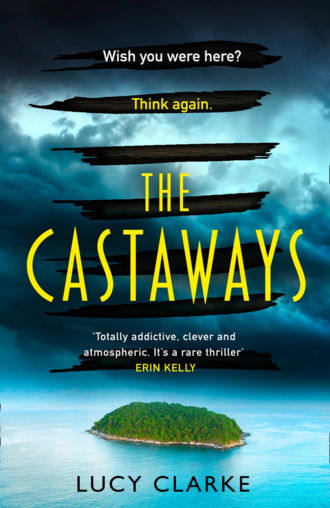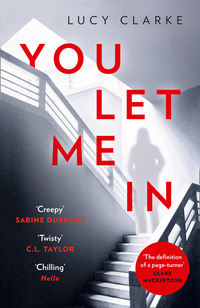
Полная версия
The Castaways
Nothing.
I narrow my eyes, squinting to find something different amid the gaps in the information.
When the plane disappeared, I wanted to gather every shred of evidence. I hounded the police, the British consul, CAAF – the Civil Aviation Authority of Fiji. I demanded to know the search areas they’d covered, ticking them off on my own chart of the Fijian archipelago that is tacked to the wall behind me. I located some of the relatives of the passengers, rallying them to keep pressure on the authorities. I read every book I could find on plane crashes, or survival stories against the odds. I wrote press releases to keep the plane’s disappearance on the media’s radar.
‘It’s becoming an obsession,’ one of my oldest friends, Sarah, told me during a Skype call from Berlin.
‘You’ve got to forgive yourself,’ Ben had chimed in from the background, while pouring white wine into large glasses on a gleaming counter. The sight of the two of them together was still like a fist in my stomach. At school, Ben once said the three of us were like the sides of an equilateral triangle: every side linked, equal, our matching angles making perfect symmetry. Huh. Funny how that shape got flattened when they announced they’d fallen in love and were moving to Berlin together.
There’s nothing new to discover sitting in Lori’s old room, drunk. But still, I can’t help looking. I stretch across the bed, sliding a file towards me. It contains all the correspondence I made in the weeks and months following the plane’s disappearance. I started the file because I needed to do something. Waiting was dangerous territory. Too much space for my mind to screech and holler, point and blame.
I open the file at random and scan the page, reading an email from a member of CAAF, confirming that although they were no longer actively searching, the incident would remain open indefinitely.
Open indefinitely. How do you live with that?
I know the story doesn’t have a happy ending. A plane doesn’t just disappear because it’s landed at the wrong resort and all the passengers are merrily sipping cocktails and swinging their hips in hula skirts. A plane disappears because there is a big fucking problem. I need to know what that problem was. I need to know what went on after that last transmission from the pilot. I need to know what happened to my sister. I need to know who the hell I can blame because, right now, the only person I’ve got is the one who didn’t turn up at the airport like she was supposed to; who didn’t get on that plane; who is still here, sitting in the fucking spare room where her sister should be!
I grab the file and fling it across the room. It slams into the wall, the ring binder wrenching open, sending pages and photos fluttering to the floor like broken wings.
Another good reason for not subletting: propensity to outbursts of aggression.
In the spill of articles, my gaze lands on one of the passengers: Felix Tyler, age 27 at the time of the flight. In the photo he’s wearing a beanie pulled low to his brows, dark hair spilling towards his chin. Peat-brown eyes staring out from beneath heavy lashes. Attractive in a wrong-side-of-the-tracks kind of way. I read everything I could about him – and all the passengers – because I wanted to know exactly who each person was on that flight; why they were flying; what they would have been like in a crisis; who my sister would have been with in that moment of descent.
But Felix, he’s the one who made me wonder. He bought his ticket to Fiji forty-eight hours before flying. I spoke to the resort owner on the island where the plane was bound, who told me Felix was due to head up their water-sports operation for a few weeks to cover for their normal guy. I managed to get hold of a copy of his CV and PADI certificate, but when I looked into it, his references didn’t check out and his diving qualification was forged. Felix Tyler was a free-climber, not a diver. A climber who, eighteen months before the flight, had fallen fifty foot onto granite, without a harness or helmet, breaking fourteen bones in his body. He hadn’t climbed since.
Something like that must change a person.
I tried contacting his family, but his father died three months after the plane disappearance, and his stepmother refused to talk. Felix’s climbing core were impossible to track – a cluster of off-grid types chasing remote peaks and ridges. I emailed everything I’d found out to the British consul and the police – but apparently a forged PADI certificate and fake references don’t add much to an investigation into a plane disappearance.
But what I was thinking – what still circles my mind in the middle of the night when I can’t sleep – is, Why? Why did he lie? What else did he lie about?
4
THEN | LORI
In the boarding lounge, Lori stood at the window rotating the bangle on her wrist. Still no sign of Erin.
The plane waited on the sun-struck tarmac, a red line slicing through the belly of it, as if it had been marked for an incision. Small planes were the worst, she thought, her pulse audible in her ears. Too insubstantial. Every bump or jolt of turbulence, every buffeting of wind and weather – she’d feel it all. She counted the windows on the near side. Eight. Pictured herself climbing the steps, the clang of metal, the sun on the back of her neck. It was just an hour-long flight. She could manage that.
Out on the runway, a man in blue overalls approached the plane, peering at something beneath it. The engine? The fuel store? She’d no idea what went where. He angled his head, looking more closely. A second man approached, dressed in a high-vis orange jacket. They seemed to be debating something, arms gesturing towards the plane, then back towards the airport hangar. After a few more moments, the man in the high-vis jacket strode off, leaving the other man crouched down, brow still furrowed. Eventually, he, too, got to his feet, shrugged, and walked away.
What’s with the shrug? What’ve you seen? Is there something wrong with the plane? God, being a nervous flier was exhausting.
She made herself turn from the window. Further along stood a man dressed in chinos and a polo shirt, an expensive leather holdall at his feet. Business traveller, she decided. He glanced towards the gate entrance, a mobile pressed to his ear. ‘It’s Daniel. I wanted to make sure we’ve got everything … straight,’ he said, his voice low, moneyed. There was a pause. He shifted his weight from foot to foot. ‘I know,’ he said, nodding vigorously. ‘I owe you.’ He jangled the change in his pockets. ‘Second thoughts?’ His hand slid free of his pocket, moving to the back of his neck, gaze searching out the plane. There was a sheen of sweat on his brow. ‘Maybe.’
Her book. She should read. That would quieten her mind. She made herself take a seat and went through the motions of getting out her book, opening it, setting her gaze on the page. She re-read the same sentence three times, failing to take in the story. Her legs felt restless, twitchy.
She glanced up to see a dark-haired man crossing the boarding lounge. He shrugged a large backpack to the ground, then slumped into a plastic chair at the end of a row. He clamped headphones over his ears, lowered his chin to his chest, folded his arms and closed his eyes. She watched as his shoulders visibly relaxed, fingertips drumming to the secret beat in his ears.
Her gaze travelled to his face. A mess of dark hair hung forwards, meeting the thick stubble that cloaked his jaw. His clothes – slim grey jeans and a T-shirt – looked tired, slept in, matching the shadows beneath his eyes.
She wondered what sort of customer the resort would draw. Ecologically minded, yet with details of luxury, it had said on the website.
The man’s eyes snapped open and he suddenly drew his phone from his pocket, reading something on screen. His whole body tightened. The edges of his nostrils flared. He sat rigidly still, not moving, not blinking. A glassy sheen swam across his eyes. He pressed his forefinger and thumb hard against his eye sockets. The skin across his right knuckles was flayed, raw cuts yet to fully knit.
Focus on your book, she told herself, gaze returning fleetingly to the page – before darting back to this man.
He’d begun typing something into his phone, stabbing at the screen. He paused, reading whatever he’d just typed. He tapped the screen once. Lori watched, surprised when he snapped off the phone case and yanked open the back, digging a fingernail beneath the SIM card to release it. He took a coin from his pocket and scraped it roughly against the matt metal surface.
When it was done, he strode across the room, and tossed both the SIM and his phone into the bin.
As the man turned, his gaze met Lori’s. He stopped. Stared right at her.
Heat rose in her cheeks as if he’d caught her spying.
His glare was fierce, defensive. A challenge in it.
She shifted in her seat.
His gaze bore into her, like a wolf’s, hackles raised.
Lori wondered if she had time to go to the toilet again. Could you leave the boarding lounge when you’d already shown your ticket? She pressed discreetly against her bladder. Maybe she could hold it. Just nerves.
An American couple were pulling matching wheeled luggage behind them. ‘We’re celebrating our fortieth wedding anniversary,’ the man was telling a young amber-haired woman beside them.
The young woman nodded in a distracted way, something wary or worn in her expression. Her hand was cupped around her front, where a newborn was nestled in a sling against her chest. Lori glimpsed the baby’s round head, a pale spray of fine hair. She hadn’t expected there to be children flying to the resort. In fact, the remoteness of it, the lack of family-friendly facilities, was part of the appeal.
A baby boy, she saw now, as the mother turned. He must only be a few months old, a similar age to Pete’s daughter. Bessy, he’d called the little girl. She’d wanted to hate the name but didn’t.
Pete.
Always Pete.
What was it Erin had said last night? That Lori had always put him on a pedestal. ‘He let you down, Lori. He cheated, he left.’
He left.
She didn’t need reminding. She’d lived it.
She pressed her lips together, looked up at the panelled ceiling.
Not now. No tears. If she was going to get herself on that plane, she needed to hold it together.
‘Miss? Excuse me, Miss? We’re calling all passengers now for boarding.’
She looked up, startled. The airline steward was gesturing towards the walkway, where other passengers were beginning to move down a long corridor. Her gaze searched for Erin, looking for the short, quick strides, the shock of dark hair, the backpack as large as her.
Lori would forgive her. She would. If Erin came now, apologised.
A flush of hot–cold panic washed through her. ‘My sister,’ she began. ‘She’s meant to be on this flight. I’m waiting for her. She’ll be on her way.’ She was aware that her voice sounded thin, near breaking.
‘I’m so sorry,’ the air stewardess said gently, ‘but the gate is closed now. I’m afraid she’s too late.’
5
NOW | ERIN
I feed my hands into the pockets of my too-thin coat, lifting my shoulders towards my ears. The jostle of commuters tightens, everyone eager to get home. I plant my feet wide, hold my ground.
My hangover – earlier a flaming heat in my head – has dulled to a baseline note at the back of my skull. I give an involuntary shudder thinking about that guy I brought back last night, his bewildered expression as he stared at the newspaper clippings in the spare room. At least I didn’t sleep with him. I’ll take that as a win.
The air underground is stale, the faint tang of urine and cooked food drawing through on the body-warmed breeze. I wish I’d ridden my bike to work. I knew I’d regret it, but this morning I slept through my alarm, then woke late in one of my weird-inward-hangover moods, and couldn’t muster the enthusiasm for rain-slicked tarmac or the clammy pinch of waterproofs.
The tunnel seems to inhale with the approach of a Tube, the crowd being sucked towards the platform edge. Nothing more enticing than a ready-meal lasagne and a bottle of wine swings in the plastic bag hooked over my wrist, but still I’m eager to get home, stand under a hot shower, wash the day from my skin. I’ve spent the afternoon traipsing across London interviewing three karaoke singers who’ve formed a band that’s had a Top Forty hit.
You would’ve probably loved them, Lori. I smile into my scarf, thinking about the car-radio wars we used to have as teenagers, me leaning across the backseat trying to eject her pop mix-tape, complaining that my ears were bleeding; Lori ramming the passenger seat as far back as it would go to stop me; Dad threatening to put on Radio 4 if we didn’t pipe down.
When the Tube draws in, it is already full. I squeeze my way inside and stand for seven stops, grateful to be in trainers rather than the black patent heels worn by the woman next to me, who is kneading her knuckles into her lower back. Eventually the crowd thins and, by Kennington, I finally get a seat. I pull off my woollen hat and stuff it in my pocket, then roughly scratch my head.
Rotating the black stud in the cartilage of my ear, I glance absently across the carriage. A woman opposite reads an evening paper, her forehead shiny and pink, puffy pouches settled beneath her eyes. Is she going to be opening a front door onto the smell of home-cooked food? Or will she be feeding an electricity meter, hearing the ping of the microwave, sitting under a duvet scrolling the Netflix menu, too?
The woman turns the paper and, as she does so, the front page is exposed.
My skin tightens. My breath halts.
It’s him!
I stare at a photo of a middle-aged man wearing a white pilot’s uniform, with a three-barred gold logo on his left shoulder. His hair is cut short, grey peppering the steel-dark. It’s the same photo that’s pinned to the wall of my spare room.
Mike Brass, the captain of flight FJ209.
Two years ago, this photo was in the press day after day as speculation slammed into the nation. As days turned into weeks and no new details emerged, the story gradually slid from page one to the middle section of the newspapers, until it was just a footnote, a fading memory in the public’s attention. But his face has stayed in my thoughts, burning bright. I’ve studied this photo, looking for clues in the crinkle of those icy blue eyes, the lips that turn into a slow smile. Now, here he is once again, on the front page.
Why now? I’m wondering, pulse flickering in my throat. It’s not the anniversary of the plane’s disappearance. There’s been no new information for months. The story is dead in the water.
I must see the headline. I’m out of my seat, stepping across the carriage. ‘I need to …’ I say as my fingers reach out.
The woman gasps, drawing the paper towards her chest and – in that moment – I see it, the full stretch of the headline, stamped in black capitals.
‘DEAD’ PILOT SPOTTED ALIVE IN FIJI
The carriage retracts. My vision narrows.
My whole body begins to tremble: fingers, legs, teeth.
The Tube lurches to a stop and I stumble into the woman clasping the paper. She cries out and everyone turns to look. She gets to her feet, dusting herself off as I mumble an apology. She tosses the paper into her vacated seat and makes for the doors, head shaking.
I snatch up the paper. I’m aware of the rush of blood in my ears, the inky smell of damp print. The Tube doors close and we rattle on, wheezing underground.
The paper feels sticky in my sweating palms. I’m blinking too quickly, breathing too hard. I begin to read.
Captain Mike Brass, pilot of flight FJ209, which disappeared somewhere in the South Pacific two years ago, has been found alive. In the early hours of this morning, he was admitted to a Fijian hospital by his employer, after he collapsed. He was recognised by a member of the nursing team, who contacted the local police.
It is believed that he has been living on Fiji’s main island, Viti Levu, under a false identity since the disappearance of flight FJ209. He has been using the alias Charlie Floyd, while working as a handyman at a resort in the interior of the island.
His wife, Anne Brass, who lives in Perth, has been interviewed by the police and claims she had no idea that her husband was alive. ‘He hasn’t tried to contact me.’ Anne and Mike Brass have a son, Nathan Brass, who also lives in Perth.
My thoughts are screaming.
The pilot survived.
Breathe. Breathe.
I scan the rest of the article, which reframes the original details of the plane disappearance. It ends with a final paragraph, reading: A spokesperson from the Fijian government commented, ‘Captain Mike Brass is currently in the care of a team of doctors. We are hoping his condition will stabilise so he can help us with our investigation into the disappearance of flight FJ209.’
The pilot has been alive this whole time.
I look up, catching myself in the reflection of the darkened Tube window. My face is leached of colour, brows knitted, lips pulled tight. Saliva pools in the back of my throat, the tang of bile chasing it.
It’s impossible, isn’t it?
I’ve imagined it, hypothesised about it, dreamt about it. I’ve been desperate to believe that there could be some explanation, some reason that defied logic to mean the passengers could walk out of the wreckage alive.
Everyone told me to let it go.
Let my sister go.
There was so little information to go on – no black box recording, no plane wreck, no sightings – that it was as if the plane simply disappeared into thin air. All manner of theories were raised in the media and conspiracy forums: hijackers; thermostatic conditions causing spontaneous combustion; an act of God; pilot suicide.
No word. No clue. Not for two years. Nothing. Not even a trace.
Until now.
Now there is a pilot.
Конец ознакомительного фрагмента.
Текст предоставлен ООО «ЛитРес».
Прочитайте эту книгу целиком, купив полную легальную версию на ЛитРес.
Безопасно оплатить книгу можно банковской картой Visa, MasterCard, Maestro, со счета мобильного телефона, с платежного терминала, в салоне МТС или Связной, через PayPal, WebMoney, Яндекс.Деньги, QIWI Кошелек, бонусными картами или другим удобным Вам способом.




